
Depending on your capacity for outrage, Andrew Cockburns Kill Chain: The Rise of the High-Tech Assassins is a pretty depressing book. In under 300 pages, Cockburn places the world of drone production and use into a long yet fruitless wish of the US military to see, identify, and be able to strike anything on the field of battle.
In the Vietnam war, Cockburn explains, this effort was codenamed Igloo White. Thousands of acoustic, seismic, and even olfactory (thats smell-based) sensors were dropped across the Ho Chi Minh trail — thousands of square miles — in order to track the movement of supply trucks, which if destroyed would slowly starve the Vietcong war effort. To get that done, the sensors would relay their information to a central computer in Thailand, and attack aircraft and local cluster bombs would do the killing.
In the Cold War that grew after Vietnam, it was a surveillance network code-named Assault Breaker. Airborne radar systems were trained on the northern European plains of a potential World War III triggered by Soviet aggression. The systems proved too sensitive to distinguish tank movements from those of cars and even wind-swept trees. And in the 90s, it was with drones, who would be conveniently capable of both critical tasks — seeing everything and killing anyone.
Cockburn often distances himself from the subject of drones to explain the circumstances that made their ascent possible in the 90s. On the technical side, this was the launch of GPS satellites and the exponential bandwidth for information made possible by trans-Atlantic fiber-optic cables. But military culture and priorities also set up the demand that drones could fill, and that topic is what gets Cockburns real attention.
Readers are taken back to World War II, when a government-run think tank known as the Jasons submitted that the German war machine would collapse with the destruction of 154 key targets (which, even when they could be located and hit, either turned out not to be so vital to the enemy war effort as supposed, or the Germans adapted by replacing them or using substitutes.) In the Iraq war, these key targets were no longer just things—bridges, oil tanks, and power plants—now they could be people. All to say that drones played very well into a long-standing military fetish for ending wars quickly by hitting enemy regimes (or drug cartels, as Cockburn also explains) where it hurts.
But as the author interviews sources from every corner of the national security apparatus (including DCGS, the supercomputer network designed to make sense of the oceans of data collected by drones), he finds that there is strong evidence against the effectiveness of targeted killings. In the war on cocaine, eliminating kingpins actually increased supply. Similarly, in the Middle East to which the kingpin strategy was transplanted, Cockburn writes, slain commanders were quickly replaced by younger ones eager to prove themselves with renewed aggression.
A big player in the rise of drones — despite the poor track record — is the vicious competition among the US militarys services, each of which jockey for greater budgets and the roles and missions that justify them.
Rex Rivolo, a former pilot and one of the books protagonists, studied the lethality of Iraqi neighborhoods 30 days before and after the death of a commander based there. Each killing quickly prompted mayhem, Cockburn writes. Within 3 kilometers of the targets base of operations, [IED] attacks over the following days shot up by 40 percent.
And somewhat paradoxically, even though targeted killings arent effective, Cockburn argues that neither are the drones and surveillance systems that make them possible. During nine days of testing in Nevada, the Predator proved incapable of flying in bad weather and could find less than a third of its targets, and rarely could the difference be seen between a tank and a truck.
A big player in the rise of drones — despite the poor track record — is the vicious competition among the US militarys service
